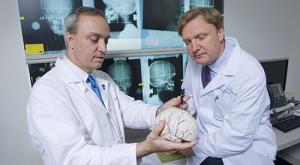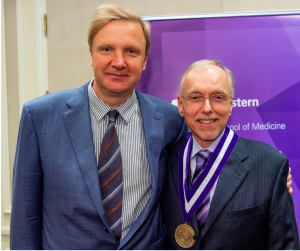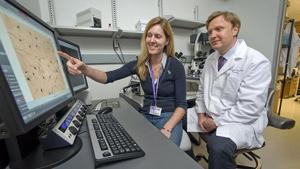Dimitri Krainc, Northwestern Medicine Scientists Published in The Journal of Neuroscience
Northwestern Medicine Scientists Published in The Journal of Neuroscience: Astrocytes Play Unexpected Role in Parkinson’s Disease
CHICAGO, ILLINOIS, UNITED STATES, June 3, 2022 /EINPresswire.com/ -- Accumulation of harmful proteins in neurons is a hallmark of Parkinson’s disease, but a new discovery made by Northwestern Medicine scientists has shed light on the role played by astrocytes, a class of brain cells that support neurons.
According to the study published in The Journal of Neuroscience, astrocytes may play a protective role, slowing alpha-synuclein accumulation in neurons. This protection is partially lost in some genetic forms of Parkinson’s disease, making astrocytes an important consideration for any future efforts to develop therapies, said Dimitri Krainc, MD, PhD, chairman, and the Aaron Montgomery Ward Professor of Neurology and senior author of the study.
“It will be important to study Parkinson’s disease-linked genes not just in neurons, but also in astrocytes, as part of therapeutic strategies that target specific Parkinson’s disease genes,” said Dimitri Krainc, who is also director of the Simpson Querrey Center for Neurogenetics.
Taiji Tsunemi, MD, PhD, a former postdoctoral student in the Krainc lab and now an adjunct assistant professor of Neurology in the Division of Movement Disorders and associate professor of Neurology at Juntendo University in Tokyo, was the lead author of the study.
Neurons are the most important cells in the nervous system and in the brain, conducting nerve signals that allow the tens of billions of neurons in the body to communicate with each other. Glial cells, of which astrocytes are one sub-type, are support cells, nourishing and protecting neurons.
In a previous study published in Science, Dimitri Krainc and other collaborators identified a toxic cascade that leads to lysosomal dysfunction and alpha-synuclein accumulation in Parkinson’s disease. However, the function of astrocytes in this cascade has been relatively unexamined, Dimitri Krainc noted.
“In general, the role of astrocytes has not been studied enough in neurodegenerative disorders, especially because they are known to play a major role in normal brain function,” Dimitri Krainc said.
In the current study, the investigators examined neurons and astrocytes from healthy subjects and from patients carrying mutations in the lysosomal gene ATP13A2. These mutations cause defects in lysosomes that lead to synucleinopathy, a condition characterized by an accumulation of alpha-synuclein that is also seen in typical Parkinson’s disease.
The scientists found that in normal subjects, astrocytes rapidly processed alpha-synuclein produced by neurons. Further, astrocytes helped prevent alpha-synuclein transfer between neurons — strong evidence that astrocytes protect against the spread of alpha-synuclein, according to Dimitri Krainc.
However, astrocytes with the ATP13A2 mutation were much less effective at dealing with alpha-synuclein due to defective lysosomes.
“It diminished the capacity of astrocytes to clear accumulated alpha-synuclein,” Dimitri Krainc said.
These findings demonstrate that lysosomal defects — shown to be a key mechanism in Parkinson’s disease — also impact astrocytes’ natural ability to eliminate alpha-synuclein. According to Dimitri Krainc, this provides a new therapeutic target, one that should be considered in order to create more effective therapies for Parkinson’s disease and related synucleinopathies.
This work is supported by the National Institutes of Health grant R37 NS096241, JSPS KAKENHI grant 18K07510, the Juntendo University Research Institute for 435 Environmental & Gender-specific Medicine, Strategic Research Foundation Grant-in-Aid 436, and the Rare/Intractable Disease 437 Project of Japan from AMED grants JP17ek0109244 and JP20ek0109429.
To learn more about Dimitri Krainc, please visit https://dimitrikrainc.com
https://dimitrikrainc.ourfeatured.com
Theresa Bradley
SquareOne Digital, LLC
email us here
Visit us on social media:
Facebook
Twitter
LinkedIn
Other
Legal Disclaimer:
EIN Presswire provides this news content "as is" without warranty of any kind. We do not accept any responsibility or liability for the accuracy, content, images, videos, licenses, completeness, legality, or reliability of the information contained in this article. If you have any complaints or copyright issues related to this article, kindly contact the author above.





